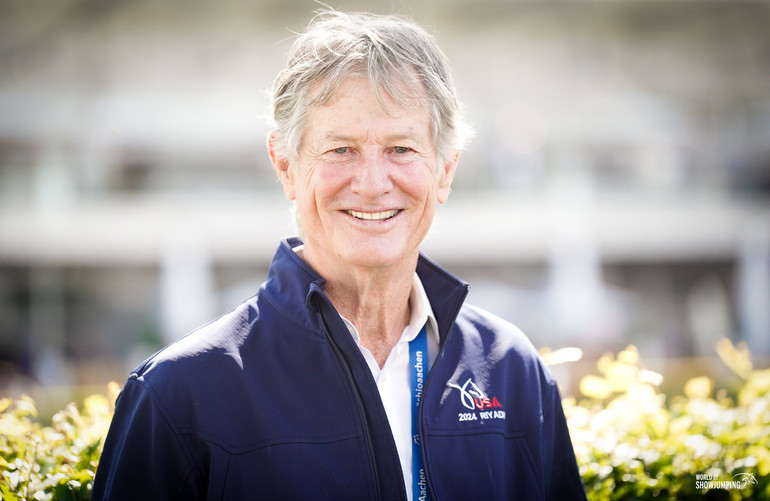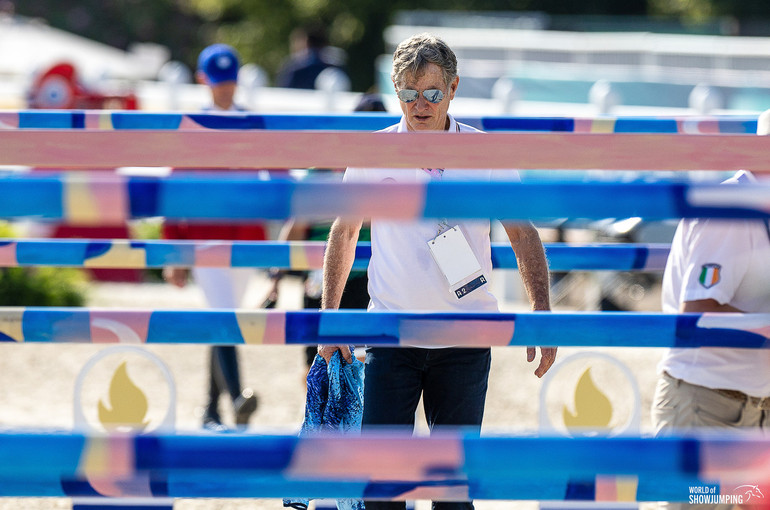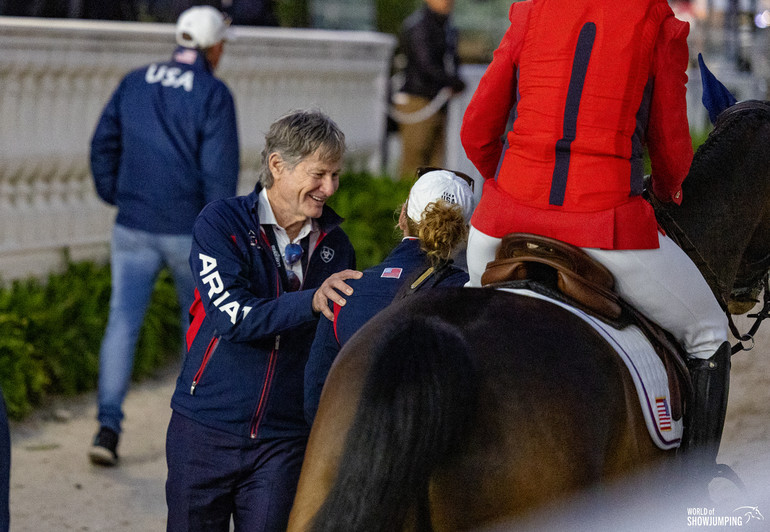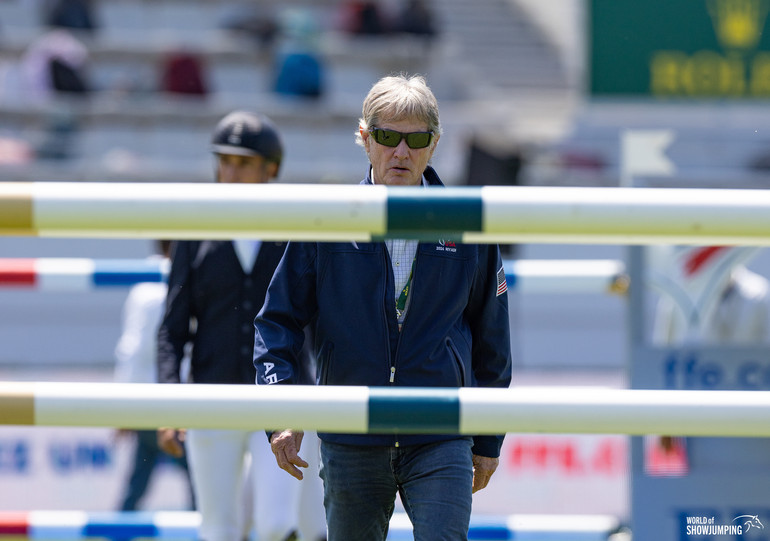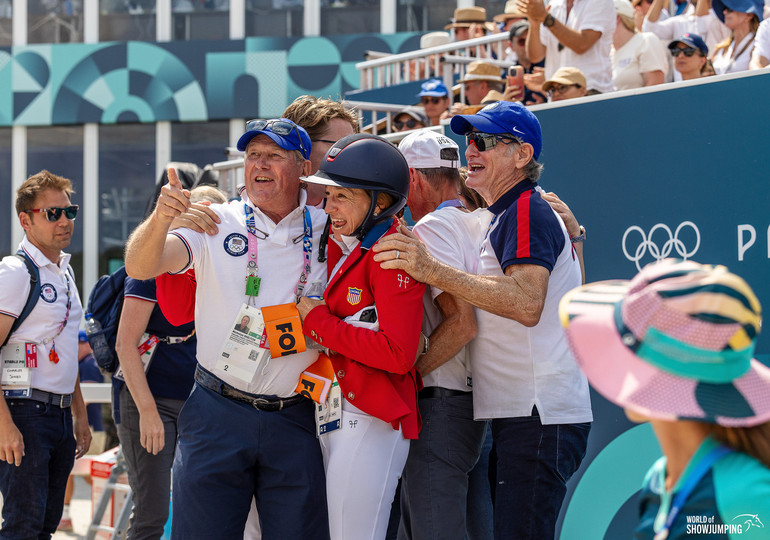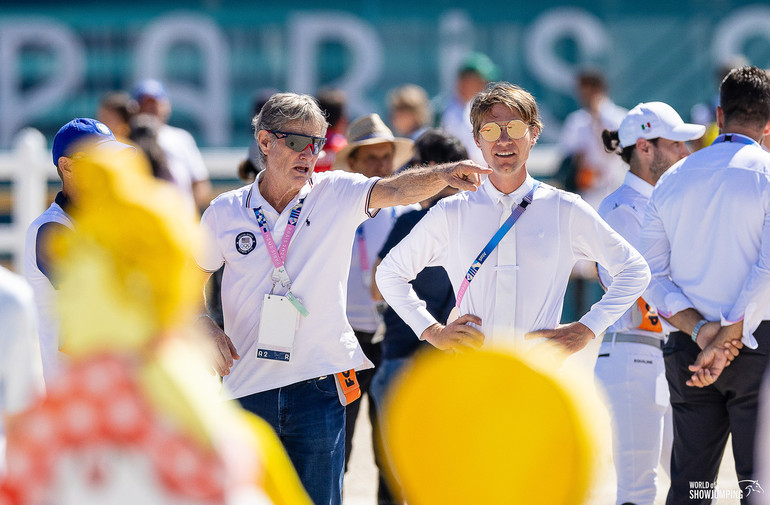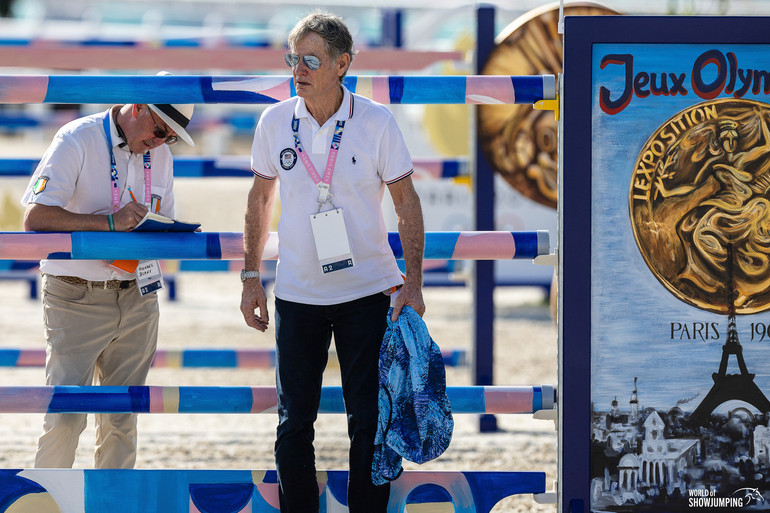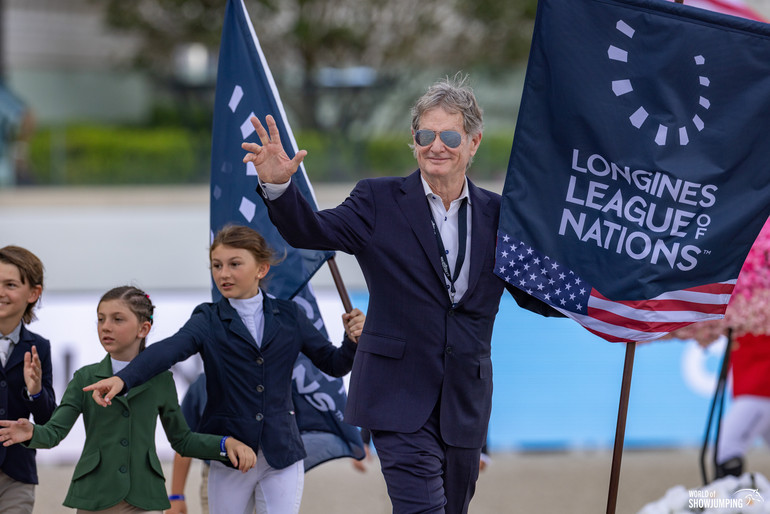Text © World of Showjumping
“If I ever wake up not excited about the opportunity of doing what I am doing and being involved in a sport that I think is one of the greatest sports ever invented, that's the day I'll move on,” Robert Ridland – the U.S. chef d’equipe – tells World of Showjumping. “However, to this day, I am just as excited being involved with this sport as I was when I was nineteen. The dynamics of our sport involve an animal and an interesting physical dynamic of weight, strength and being in balance with each other, so that neither men nor women have an advantage. To me, what our top athletes can do on the biggest stage is something that's very exciting to be part of.”
And Ridland has been a part of a lot. Doing his first international appearance as part of the U.S. national squad at nineteen, he has not only competed on the highest level, but also done course design and commentating and he still owns an event management company that runs the venue at San Juan Capistrano. For the past twelve years, Ridland has been the chef d’equipe for the U.S. jumping team – succeeding George Morris. “I have always liked new challenges, and I have enjoyed every phase of my life. However, the most important thing to me is my family,” Ridland – who has two children, McKenna and Peyton, with his wife of 26 years, Hillary – says. “The only downside of what I do is being pretty often far away from California.”
World of Showjumping sat down with Ridland to hear his personal story – from chasing hurricanes and stepping in when others gave up – as well as his thoughts on team management and experiences at the 2024 Olympic Games in Paris that marked his 8th Olympic attendance in various capacities.
If you survive, you learn
Ridland grew up in California and like many top riders of that time, trained with Jimmy Williams, who was a legendary professional in Pasadena. “Riding was one of the many sports I did in high school,” Ridland explains. “We lived down in San Diego, so Pasadena was a couple hours north in the LA area and I spent several summers there. Jimmy used to tell me to just ride every horse he gave me to ride, and that there wouldn’t be any good ones in the bunch, but if I survived, that's how I would learn. That was the way he worked and that was where I got my basics.”
Jimmy used to tell me to just ride every horse he gave me to ride, and that there wouldn’t be any good ones in the bunch, but if I survived, that's how I would learn
When Ridland was competing actively, riders for the U.S. team were selected separately from the horses – which were either donated or loaned to the team, with the headquarters being in Gladstone. “I did my undergraduate at Yale and took a year off between my junior and senior year, prior to the Munich Olympic Games,” Ridland – who has a major in political science – explains. “I worked for the City of New York at the City Hall, but I lived in Gladstone because I was training for the Olympics. I would ride first thing in the morning, then get on the train to New York, work there and come back late at night. That was how I finished up my studies and made the team for the Olympic Games.”
“I did a semester at Columbia Law School as well, as I wasn't quite sure which direction I was going to go professionally,” he continues. “During the first semester I got quite disenchanted with the very competitive nature of the school and the feeder system for the high paying legal jobs in New York, which I wasn't interested in."
I feel very fortunate to have been able to make a living out of something as amazing as competing in our sport
"One day, I got a call from our chef d’equipe Bert de Nemethy. We didn't have five-star events back then, but there was an exhibition event with a lot of prize money down in Mexico City and I had a spot there that he had to offer to me due to my high ranking, even though I was busy at law school. First, I declined. As I hung up, I thought that was the craziest thing I've ever done, turning down something exciting. I went to the dean of the law school and told him about my predicament. He told me that if he was me, he would call back and say I had made a mistake declining the offer. The dean gave me an unlimited leave of absence so I could go to Mexico, and if I changed my mind, I could come back. That decision got me into riding professionally.”
“Certainly, a phase of my life that basically defined to a large extent who I am was when I was an international competitor,” Ridland says. “It was an opportunity and an experience that only a few people get to do and I feel very fortunate to have been able to make a living out of something as amazing as competing in our sport.”
From chasing hurricanes to course design, commentating and event management
However, riding professionally did not end up being the last equestrian-related adventure for Ridland. During the 1986 World Championships in Aachen, he was asked to do commentary for CBS Sports. “I ended up doing way less riding and more broadcasting,” he says. “I actually did a lot for ESPN and CBS. Later on, I did two Olympic Games commentating for NBC; Barcelona and Athens. In many ways commentating was the easiest thing that I did, because all you have to do is talk – and I can talk! I enjoyed that, but I also enjoyed learning the behind-the-scenes stuff of what broadcasting is all about.”
In many ways commentating was the easiest thing that I did, because all you have to do is talk – and I can talk!
Another job Ridland was asked to do was course design – back when you did not really need a license for it. “They called me up from the Southampton Horse Show, and I thought this would be cool,” Ridland recalls. “Southampton has always been in the calendar for early September, where occasionally there are hurricanes in Florida. A hurricane was coming up the East Coast and we were watching it coming. They had rented a house in the Hamptons for the officials, so I was there with the judges and announcers when the eye of the hurricane hit right for us. We don't have hurricanes in California, so even though we were told to stay in the house, I went out to follow the hurricane, because I thought it was exciting. This was a hurricane for sure, but it wasn't one of the super destructive ones. I wanted to know what it felt like, and it was so cool; the sky was pea green, it was eerie. The most amazing thing was all the birds that were trapped in the eye of the hurricane; it was like an Alfred Hitchcock-movie. That was two days before my first course designing job!”
 Ridland organized the World Cup in Las Vegas, including the Finals in 2000, 2003, 2005, 2007, 2009 and 2015. "Our first World Cup in Las Vegas in 2000 was such a departure from the way the sport had been promoted in our country and in Europe at that time and it was really fun to be part of that change," he says. Photo © Nanna Nieminen/WoSJ.
Ridland organized the World Cup in Las Vegas, including the Finals in 2000, 2003, 2005, 2007, 2009 and 2015. "Our first World Cup in Las Vegas in 2000 was such a departure from the way the sport had been promoted in our country and in Europe at that time and it was really fun to be part of that change," he says. Photo © Nanna Nieminen/WoSJ.
And then, again by accident, Ridland got into event management. The owner of a facility in Del Mar that was going to run a World Cup qualifier wanted to cancel at the last minute, so Ridland stepped in to save the event. “I went off the deep end, called him up – and I didn't know him that well – and said I was going to be at his doorstep in about 20 minutes,” Ridland explains about a meeting that ended with him acquiring the event management company he still owns. “He was worried about losing money, and I told him I'll guarantee he won't lose money, put a dollar on the table and bought his event. Then I drove to the bank, sat down and said I needed money because I was going to run a horse show. ‘How long have you been running horse shows’, they asked – and my answer was ‘well, about two hours’.”
‘How long have you been running horse shows’, they asked – and my answer was ‘well, about two hours’
With this venture that started in 1992, Ridland went on to organize the World Cup in Las Vegas, including the Finals in 2000, 2003, 2005, 2007, 2009 and 2015. “In 2000, we took the entertainment aspect to a different level and I got to work with a gentleman named Sean Davis. Sean put on the National Finals Rodeo, which is a very popular, sold-out event in Las Vegas. We sent him over to Europe to watch a couple World Cup qualifiers because he didn't know the sport at all. He came back saying he didn’t understand how people even show up for those events, that they had been the most boring things he had ever seen. He thought the sport itself is exciting, but everything around was too slow. Therefore, we wanted to figure out how to make our event in Las Vegas much more like the National Finals Rodeo, which is fast-paced. Our first World Cup in Las Vegas in 2000 was such a departure from the way the sport had been promoted in our country and in Europe at that time and it was really fun to be part of that change.”
Like putting together a jigsaw
Just like course design, commentating and running an event management company, the role of a chef d’equipe was not something Ridland planned for. “George Morris decided that 2012 with the Olympic Games in London would be his last year, so the U.S. federation opened the application process. Many people asked me to apply, but I kept saying no. Eventually, I got my family together and we agreed that I would throw in an application – 24 hours before the deadline.”
For me, it was invaluable being able to shadow George Morris through the crucial parts of what led up to the Olympics in 2012
“For me, it was invaluable being able to shadow George Morris through the crucial parts of what led up to the Olympics in 2012,” Ridland explains about learning the ropes of being a chef d’equipe. “I think the role of a chef d’equipe in our sport is like the head coach of an NFL football team; the head coach doesn't teach the quarterback how to throw the ball. If I have any input that's useful, I'm obviously out there, but I'm not teaching these rockers how to rock; I'm not coaching. My role is more about overseeing the strategy and probably more importantly, seeing the long-range picture. My job is to assemble the best team for the championship events that really count and manage the lead-up to these events. Overall, a chef d’equipe’s role is like managing the pieces of a jigsaw.”
While a lot has changed in the sport since his riding days, Ridland believes that top professionals are still top professionals, and what separates them is their mindset and attitude. “Honestly, I don't feel that it is that different, but it is brought up a lot,” he says about the increase of money – both in costs as well as in prizes – in the sport today. “A horse is always going to be a lot more expensive than a tennis racket. And if you're a football player, you can't do your profession unless somebody quite wealthy owns a football team and has a stadium. Our sport requires a pretty big investment and where that investment comes from is not my concern. Whether it's a family situation or not, it is still the same kind of pressure for everyone and you have to treat it as such. To me, when I say we have top professional riders, that is a state of mind. When I use that definition, it is more about the mindset than a question of who's paying. I don't see that really has changed all that much, because in the end, it is still you, your horse and the course – and that is the way the sport has always been.”
In the end, it is still you, your horse and the course – and that is the way the sport has always been
“What has really changed is that the calendar is so much more crowded than it used to be,” Ridland points out. “There are many events in the calendar and this brings an element to the sport that we didn't have before. However, the real important events are still the major five-star CSIOs and obviously the championships, including the World Cup Final. I'm a traditionalist in the sense that to me, the great shows are the same great shows that were there when I first started my career as a rider. The great events are the ones that sustain themselves the right way; with ticket sales, with great fans. All the great Nations Cups – many of which we have been to in these past few months – are the mainstay of what our sport truly is.”
The goal remains the same while the competition gets harder
Recently, Ridland led his U.S. squad to Olympic team silver in Versailles in what was his third Olympiad as a chef d’equipe. “In my mind, it would be an absolute disaster for our sport if we were not part of the Olympic Games,” he says about the current pressure on equestrian sports and the question mark that looms over the disciplines about whether or not they will be part of the Olympic family in the future. “The fact that we are in the Olympics increases the exposure to our sport and we have to do everything we possibly can to stay in this movement and to keep improving. I am one of the few that completely endorsed the new jumping format for the Olympics that was introduced in Tokyo.”
In my mind, it would be an absolute disaster for our sport if we were not part of the Olympic Games
“I would say that the big key to assembling a team is to make sure that you integrate at all levels,” Ridland explains about the process of getting a championship team together. “Once riders reach a level where they can be considered for the team, it is about giving them the right experience. We have been so fortunate in the last two decades of having four of the iconic riders in U.S. history – McLain Ward, Beezie Madden, Laura Kraut and Kent Farrington – competing at the same period of time. However, it has been very important to me that we make a major effort to not only rely on these four riders. At some point in the future, when it is time for the torch to pass, who are you passing it to?”
“A big part of what we have done is the pathway from the ground levels on,” Ridland says. “Anne Kursinski is my assistant chef d’equipe and her bringing the three and four-star Nations Cup teams to Europe is a crucial part of the pathway. We all know that the pressure of riding on a team and having the flag on your saddle pad for the very first time can be a shock to a rider’s system. Obviously, there is pressure riding as an individual, but it is basically your horse, your groom and yourself if you have a bad day. On a team, you have teammates that are relying on what you do, a whole country that donates to the team so that we can have international opportunities – and that's a completely different type of pressure. Therefore, it is very important what Anne Kursinski has been able to do with great success; bringing riders along so that they are ready for that final step.”
There are more teams capable of being on the podium now than four years ago or eight years ago
“Ever since I first started twelve years ago, the goal has been to come back from every championship with a medal,” Ridland says. “The only time we missed is when we didn't make it on the podium in Herning in 2022. At the last two Olympics, we have been on the podium with silver – even though I would rather have gold. Our goal going to Paris was once again be on the podium. However, we knew it was going to be harder than ever, because even though we had a good team, our competition keeps getting better. The top ten teams in the world are better now than they've ever been. There are more teams capable of being on the podium now than four years ago or eight years ago. The goal remains the same, but when you start rattling off the names of our toughest competition… it is a long list.”
3.9.2024 No reproduction of any of the content in this article will be accepted without a written permission, all rights reserved © World of Showjumping.com. If copyright violations occur, a penalty fee will apply.



